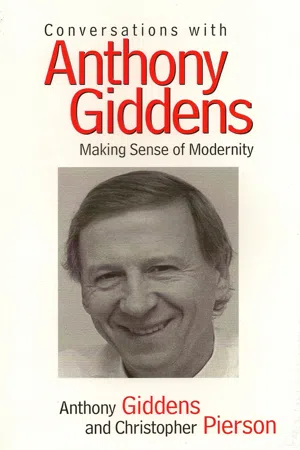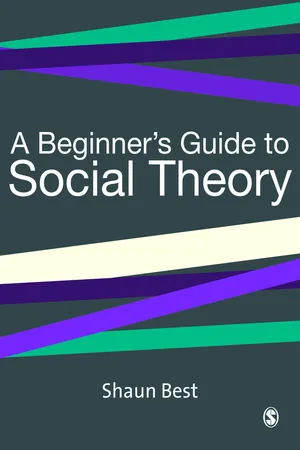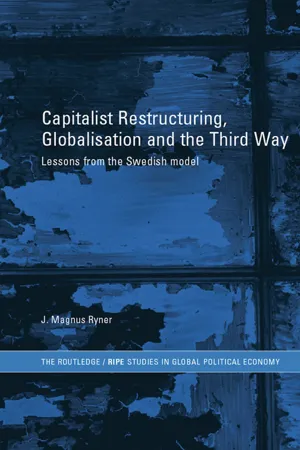Politics & International Relations
Anthony Giddens
Anthony Giddens is a prominent sociologist known for his theory of structuration, which explores the relationship between individuals and society. He has made significant contributions to the study of globalization, modernity, and social theory. Giddens' work has had a profound impact on the fields of sociology, politics, and international relations.
Written by Perlego with AI-assistance
Related key terms
5 Key excerpts on "Anthony Giddens"
- eBook - ePub
- Inger Furseth, Pål Repstad(Authors)
- 2021(Publication Date)
- Routledge(Publisher)
7 Anthony GiddensFrom sociological syntheses to political advice
DOI: 10.4324/9781003181446-8Anthony Giddens (1938–) began his academic life as a theoretically interested sociologist, but became increasingly active as an administrator, and not least as a political commentator and adviser. His most significant contribution to sociology is his attempt to build a bridge between structure-oriented and actor-oriented sociology. He analyzes critical features of Late Modernity and introduces self-reflexivity and individualization to the analysis on the decline of traditionalism. One can divide his work into several phases: first, some empirical studies, before a period of critical analyses of sociological classics; next, a distinctive design of the interplay between agents and social arrangements. From about 1990 he explored the consequences of modernity for society and individuals, and finally came a phase in which Giddens became politically involved and wrote about current societal problems, with an increasingly international perspective.Giddens has made a long journey socially, from a middle-class upbringing in London, where his father was a clerk in London Transport and his mother a housewife, until in 2004 he became Lord Giddens with a seat in the Upper House for the Labor Party. He has repeatedly teased in interviews that he started studying social sciences because he did not have good enough grades to get into philosophy. At the bachelor’s level, he probably had as much psychology as sociology in his curriculum. His interest in individual agents’ room to maneuver in society and how individuals adapt to late modern society may reflect these early studies. Drawing direct lines from life to work seems to have relatively limited interest in this case, however. Nonetheless, some reviewers of Giddens’ work point out that he went into therapy for several years around 1990, and that this experience may have informed such a book as Modernity and Self-Identity (1991).1 - eBook - ePub
Conversations with Anthony Giddens
Making Sense of Modernity
- Anthony Giddens, Christopher Pierson(Authors)
- 2013(Publication Date)
- Polity(Publisher)
The Sociology of Anthony Giddens: An Introduction
Martin O’BrienAnthony Giddens is one of the leading British sociologists of the post-war period. His writings span more than three decades of social and political change and have been at the forefront of the development of sociological theory and practice in the 1980s and 1990s. His interpretations of the classical sociological traditions have been a central pillar of much undergraduate and postgraduate teaching in sociological theory for twenty years (and continue to be so) and his imaginative reconstruction of sociology’s central concerns has stimulated academic debate and intellectual controversy in equal measure. He is an agenda-setting social theorist, a virtual one-man publishing industry, and a political philosopher of growing influence, and he has now taken on the professional challenge of directing the London School of Economics and Political Science in the uncertain era of the first Labour government since the 1970s.In introducing the extraordinary breadth of Giddens’s thinking to the new reader, I will focus on the outlines of his overall project, rather than on the critical details of any of its specific aspects. In particular, I will emphasize the connections between the different strands of his diverse output in order to provide a conceptual map of his theoretical and philosophical thinking. In this way, I want both to give a sense of the importance of his work and to disclose some of the critical questions that his reconstruction of sociology raises. I begin with some comments on Giddens’s understanding of the discipline of sociology before going on to sketch in some of the main contours of his work.The sociological enterprise
According to Giddens, sociology is a special kind of intellectual discipline. Unlike physical scientists, a sociologist seeks to understand a world that is already understood by its members. The ‘objects’ of sociological inquiry – what people say and do, what they believe and desire, how they construct institutions and interact with each other – are unlike the objects of natural sciences, such as physics, chemistry or biology, in so far as people’s actions and interactions, their beliefs and desires, are a central feature of the world that the sociologist investigates. Moreover, this world cannot be reduced to one ‘correct’ set of meanings or explanatory system. The social world is irreducibly characterized by competing and sometimes conflicting frames of meaning, understandings, and patterns of belief. When physicists dispute with each other about whether (and why) the universe is expanding, they are disputing the single, unique cause and character of the basic physical relationships between energy and matter. When sociologists dispute with each other about whether (and why) society is divided by relationships of class, gender, ethnicity or personality, they are disputing the complex intersections between different layers of social experience and action. Sociologists must develop alternative kinds of explanation for each of these social forces because there is not one unique cause and character of the basic relationships between individuals and society. - Stewart Clegg, Miguel Pina e Cunha(Authors)
- 2019(Publication Date)
- Routledge(Publisher)
4 Anthony Giddens and structuration theory Ira Chatterjee, Jagat Kunwar and Frank den HondChapter objectives
The relationship between individual action and social structure has been the subject of considerable discussion and debate in social theory. This chapter presents Anthony Giddens’ proposal to reconcile the opposition between structure and agency. His structuration theory proposes to see structure and agency as mutually constitutive, as a duality: as inseparable as the two sides of a coin (cf. Craib, 1992). It is not just that structure influences human behaviour and that humans are capable of changing the social structures they inhabit; structure enables and constrains action while simultaneously being (re)constituted through action. Such an analysis of the dynamic relationship between individual action and social structure is a topic with important empirical implications. Structuration explains the motivations for actions, the choices – real and perceived – due to structural opportunities and constraints, and the interactions involved.This chapter discusses:- Giddens and the development of structuration theory: a prologue to the theory and its genesis
- Core aspects of structuration theory as formulated by Giddens and key developments in the field
- The relationship of structuration theory to other social and organizational theories and some of the major criticisms challenging the theory
- Implications and empirical applications of structuration for research in management and organization studies
Anthony Giddens
Anthony Giddens was born on January 18, 1938 in Edmonton, north London. He was the first member of his family to go to college and, in 1974, obtained his doctorate from the University of Cambridge. He began his working life at the University of Leicester and then worked for some ten years at Cambridge University before he was eventually promoted to a full professorship (Giddens & Pierson, 1998). From 1997 to 2003, he was Director of the London School of Economics. He is currently a Professor Emeritus at the latter institution and a Life Fellow of King’s College, Cambridge. Giddens became a member of the House of Lords in June 2004, having received a life peerage as the Baron Giddens of Southgate. Giddens has had a significant impact upon British politics as an advisor to the Blair government. He has received over a dozen honorary doctoral degrees from universities around the globe.- eBook - ePub
- Shaun Best(Author)
- 2002(Publication Date)
- SAGE Publications Ltd(Publisher)
Chapter contents Giddens on the relationship between ‘agency’ and ‘structure’ From emancipatory politics to life politics Self Agency and structure Giddens’s critique of postmodernism Life politics, social movements and the far side of modernity Why are individual selves reflexive in modernity? Risk Reflexive modernisation What is individualisation? What is globalisation? Pierre Bourdieu Norbert Elias ConclusionI5
Anthony Giddens: Theorising Agency and Structure
By the end of this chapter you should:
be familiar with the concepts of ‘agency’ and ‘structure’ in the work of Giddens, Bourdieu and Elias;have an understanding of the relationship between ‘agency’ and structure;have a critical understanding of Giddens’s key concepts of structuration, modernity, time space distinctiation, globalisation, life politics, emancipatory politics, reflexive modernisation, risk society, trust and the third way;have an understanding of Elias and the notion of the civilising process. - J. Magnus Ryner(Author)
- 2003(Publication Date)
- Routledge(Publisher)
As a result of this exercise, only Giddens’ critique of the economic-rational aspects of the universal social citizenship state remains unaddressed. Given the importance of the Swedish welfare state for the social democratic ideal type, it is not surprising that the Swedish case is particularly pertinent in this context as well. Indeed, Giddens’ economic critique of ‘traditional social democracy’ fundamentally rests on a reference to the ‘moral hazard thesis’ of the economist Assar Lindbeck as developed in his diagnosis of the crisis of the Swedish economy in the 1990s. I will return to this argument in chapter 2, where I argue that it is based on a faulty reading of Swedish politico-economic developments in the 1980s and 1990s. However, the last section of this chapter will refute the contention that traditional social democracy had no conception of ‘supply-side’ economic rationality by pointing to the notion of ‘misrationalisation’ in social democratic ideological discourse. The Third Way of Anthony Giddens Left, right and the hegemony of neo-liberalism It should be made clear from the beginning that when it is suggested here that Anthony Giddens contributes to the hegemony of neo-liberalism, it does not imply that his views are identical to Thatcherism/Reaganism. This is worth pointing out, because many recent commentators on the Third Way have sought to refute the idea that the Third Way is neo-liberal. As indeed Merkel (2000: 100–101) points out, contra market fundamentalists Giddens accepts that there is a need for a social safety-net, as trickle-down economics is unlikely to ensure a tolerable level of welfare for the poorest strata of society. Giddens himself is adamant that he is not interested in dismantling the welfare but in reconstructing it (Giddens 1998: 113)
Learn about this page
Index pages curate the most relevant extracts from our library of academic textbooks. They’ve been created using an in-house natural language model (NLM), each adding context and meaning to key research topics.




